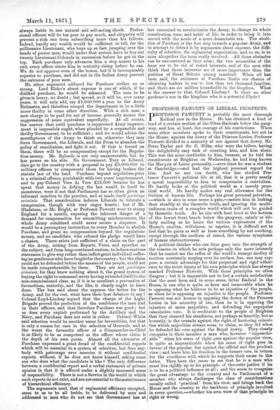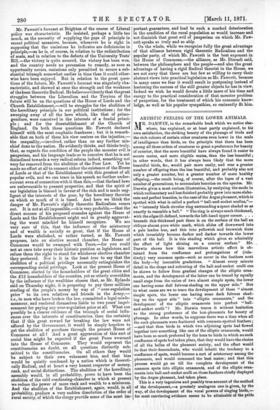PROFESSOR FAWCETT ON LIBERAL PROSPECTS.
PROFESSOR FAWCETT is probably the most thorough Radical now in the House. He has obtained a kind of lead of a certain section of the Ultra-Radicals below the gang- way, and has, at least, the courage of his convictions-. When some other members spoke to their constituents, but not to the House, against the dowry of the Princess Louise, Professor Fawcett divided in a minority of one against that dowry, Mr. Peter Taylor and Sir C. Dilke, who were the tellers, having the delightfully easy task of counting him, and him alone. This was the more creditable to him, because, as he told his constituents at Brighton on Wednesday, he had long known the Marquis of Lorne personally,—ever since he was a student at Cambridge,—and had the highest personal regard for him. And no one can doubt, who has studied Pro- fessor Fawcett's political life at all, that it is pretty nearly a moral impossibility to him to compromise a conviction. He hardly looks at the political world as a merely prac- tical world. He hardly makes any real allowance for the friction of human life. Perhaps his great personal privation, —which is also in some sense a gain,—assists him in looking thus steadily at the theoretic truth, and ignoring the multi- tudinous traits of a complex world which will not be guided by theoretic truth. As he sits with bent head at the bottom of the lowest front bench below the gangway, calmly or bit- terly smiling as he hears the various expressions of the House's caution, wilfulness, or caprice, it is difficult not to feel that be gains as well as loses something by not catching, except through the medium of sound, the various symptoms of human obstructiveness.
A political thinker who can thus gaze into the strength of the reasons on which he acts perhaps only the more intensely that he cannot see the reflex of the world's strange medley of motives constantly surging over its surface, has, one may sup- pose, a certain advantage for that perpetual and rigid adher- ence to the strict theory of his own principles which has always marked Professor Fawcett. With these principles we often disagree ; but it is impossible not to feel a certain satisfaction that the most keen and, in some sense, bitter Radical in the House, is one who is quite as keen and immovable when he is opposing what he believes to be an injustice of the people, as when he is opposing an injustice to the people. Professor Fawcett was not keener in opposing the dowry of the Princess Louise in his minority of one, than he is in opposing the injustice of mere majorities, and defending the unpopular cumulative vote. It is creditable to the people of Brighton that they cheered his steadiness, not perhaps as heartily, but as honestly, in the crusade against the right of hectoring minori- ties which majorities always seem to claim, as they did when he defended his vote against the Royal dowry. They clearly recognize in their member a man who, however " impractic- able " when his sense • of right goes against the popular view, is quite as impracticable when his sense of right goes in favour of the popular, but against the official and the prudent view ; and leave him his freedom in the former case, in return for the sturdiness with which he supports their cause in the latter. They have the sense to see that he is a man. who must live rigidly up to his principle of theoretic justice If he is to be a political influence at all ; and the sense to recognize the great advantage to the country and to Parliament of a member who always discharges the class of considerations usually called 'practical' from his view, and brings back the House and the country to the backbone of principle involved in every question,—whether his own view of that principle be right or wrong.
Mr. Fawcett's forecast at Brighton of the course of Liberal policy was characteristic. He insisted, perhaps a little too much, on the necessity of supplying the gaps of principle in recent political measures, because, whenever he is right in supposing that the omissions he indicates are deficiencies in principle,—as he is, of course, in relation to the redistribution of seats, and in relation to the defects of the University Tests' Bill,—the victory is quite assured, the victory has been won, and the country needs no persuasion to remedy, as soon as opportunity occurs, omissions only permitted to secure a sub- stantial triumph somewhat earlier in time than it could other- wise have been enjoyed. But in relation to the great ques- tions of the future, Mr. Fawcett's forecast was singularly cha- racteristic, and showed at once the strength and the weakness of the keen theoretic Radical. He believes evidently that the great struggles between the Liberalism and the Toryism of the future will be on the questions of the House of Lords and the Church Establishment,—will be struggles for the abolition of the hereditary principle in our political institutions ; for the sweeping away of all the laws which, like that of primo- geniture, were conceived in the interests of a feudal princi- ple ; and for the disestablishment of the Church of England. On both these questions Mr. Fawcett declared himself with the most emphatic frankness ; but it is remark- able that on both of them his view centres on the injustice,— the inequality,_involved, rather than on any further mis- chief done to the nation. He evidently thinks, and thinks truly, that, as regards the condition of the people the monster evil is pauperism, and his language leads us to conceive that he is not disinclined towards a very radical reform indeed, something not very far removed from the abolition of the Poor Law. Yet he made no effort at all to connect either the existence of the House of Lords or that of the Establishment with this greatest of all popular evils, and we can trace in his speech no further under- current even of connection with it than this,—that the land laws are unfavourable to peasant properties, and that the spirit of our legislation is biassed in favour of the rich and is made neg- ligent of the interests of the poor, by the hereditary theories on which so much of it is based. And here we think the danger of Mr. Fawcett's rigidly theoretic Radicalism comes out. It is not at all impossible,—it is very probable,—that the direct success of his proposed crusades against the House of Lords and the Establishment might end in greatly aggravat-
ing the worst mischief he himself recognizes. We are very sure of this, that the influence of the aristocracy and of wealth is socially so great, that if the House of Lords were abolished, or rather turned, as Mr. Fawcett proposes, into an elective second chamber, the House of Commons would be swamped with Peers,—for you could not at once take away their historic position as legislators, and refuse them the right to stand for whichever elective chamber they preferred. Nor is it in the least true to say that the abolition of a political privilege necessarily extinguishes the corresponding social privilege. Look at the present House of Commons, elected by the householders of the great cities and the £12 householders of the counties, yet so utterly overridden by the influence of the wealthier classes that, as Mr. Rylands said on Thursday night, it is proposing to pay three millions sterling of the people's money by way of "over-regulation price" to its own relatives and friends in the Army,- i.e., to men who have broken the law, committed a legal misde- meanour, and rendered themselves liable to two years' impri- sonment for paying any over-regulation price at all. What can possibly be a clearer evidence of the triumph of social influ- ences over the interests of constituencies, than the certainty that if this great reward for breaking the law were not offered by the Government, it would be simply hopeless to get the abolition of purchase through the present House of Commons at all ? And a great aggravation of this sort of social bias might be expected if the great Peers swarmed into the House of Commons. They would represent the constituencies no doubt, on all questions distinctly sub- mitted to the constituencies. On all others they would be subject to their own vehement bias, and that bias would be quietly condoned by a nation which is theoreti- cally Radical, and at heart a very honest respecter of money, rank, and social distinctions. The abolition of the hereditary assembly would, in all probability, prove to have been the abolition of the cold condensing-chamber in which at present we reduce the power of mere rank and wealth to a minimum. And the abolition of the Establishment, again, would, in all probability, produce a very sudden dissolution of the order of rural society, of Which the clergy provide some of the most im- portant guarantees, and lead to such a marked deterioration in the condition of the rural population as would increase and not diminish that great evil of pauperism on which Mr. Faw- cett speaks so truly and so ably.
On the whole, while we recognize fully the great advantage of that alliance between rigid theoretic Radicalism and the popular party, of which Mr. Fawcett is the best exponent in the House of Commons,—the alliance, as Mr. Disraeli said, between the philosophers and the people—and also the great advantage of having a rigid Radical theorist in the House, we are not sorry that there are but few so willing to carry their abstract views into practical legislation as Mr. Fawcett, because in many cases we fear it would result in postponing instead of hastening the success of the still greater objects he has in view. Indeed we wish he would devote a little more of his time and energy to the practical consideration of that monster problem of pauperism, for the treatment of which his economic know- ledge, as well as his popular sympathies, so eminently fit him.



































 Previous page
Previous page